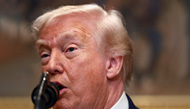A Candid Conversation on Race in America? Well, Maybe

DAVIS TURNER/EUROPEAN PRESSPHOTO AGENCY
JANNY SCOTT ESSAYAmericans and their political leaders have been hesitant to talk about the subject of race.
We were reminded of that recently when Senator Barack Obama, the front-runner for the Democratic presidential nomination, took the almost unimaginable step of going before a national audience at a precarious juncture in a close campaign and speaking explicitly about what race means to blacks and whites.
He spoke of black anger and white resentment and the significance of race in American history; his purpose was political but he spoke with seriousness and gravity .
How much the speech helped him remains to be seen.
But the moment was unlike virtually any in the more than 40 years since the triumphs of the civil rights struggle tore up party alignments of the past and tamped down explicit discussion of race by presidents and majorparty candidates .
The dynamic had been different once - when African-Americans had begun to vote Democratic as well as Republican and presidential candidates of both parties competed for their votes.
In the early 1960s, opinion polls found that a majority of Americans saw civil rights as the dominant issue facing the country.
And President Lyndon B. Johnson, in one of several memorable 1965 speeches on race, said, speaking before a joint session of Congress after the voting-rights march from Selma, Alabama: “Their cause must be our cause too.
Because it is not just Negroes, but really it is all of us, who must overcome the crippling legacy of bigotry and injustice.
And we shall overcome.
” Yet after signing the Civil Rights Act in July 1964, President Johnson is said to have observed that he had just handed over the South to the Republicans for at least a generation.
The Republicans developed the “Southern strategy” of appealing to white voters that helped Richard Nixon and later Ronald Reagan.
With blacks voting overwhelmingly Democratic by that point, and their party struggling to hold onto white workingclass ethnic voters in the North, there was little incentive for presidential candidates of either party to bring up race in a serious way.
Race did not disappear entirely from presidential campaigns; it went under cover.
It lay buried in code phrases like “crime in the streets,” “states’ rights,” and “welfare mothers.
” In 1980, Ronald Reagan, campaigning on a platform that included “states’ rights,” opened his general election campaign in Philadelphia, Mississippi - a decision criticized because it was where three civil rights workers had been murdered in 1964.
Democratic presidents Jimmy Carter and Bill Clinton addressed the race issue in various forms, but not nearly in the strong terms of Mr. Obama’s speech, historians say.
In June 1997, President Clinton proposed a year-long national “conversation” about race and appointed a high-powered advisory board to hold town meetings and report on its findings.
The undertaking was plagued by lack of organization and interference from White House officials .
“It’s not an easy subject for black people or white people,” said Ira Berlin, a historian at the University of Maryland who writes on slavery.
“As Obama indicated, there are lots of legitimate hurts on both sides.
It is extremely easy for people to misspeak.
In part because we don’t speak a lot and because we don’t speak a lot you don’t understand the language.
People don’t understand where the land mines are.
They sometimes use the wrong words or are condescending or seem to be condescending when they’re trying to be honest.
It’s easy for people to take offense when the wrong language is used, particularly when they’ve got within them a lot of anger and are looking for someone to beat with a small stick.
In those circumstances, it’s often better to say nothing.
” For more than a year, Mr. Obama had campaigned in such a way as to appear to transcend race, and had managed to elude narrow identification as a black politician.
But he finally confronted race head-on in the speech in Philadelphia, responding to an escalating controversy over videotaped snippets of inflammatory anti-white and anti-American rhetoric by the Reverend Jeremiah A. Wright Jr., his longtime spiritual adviser and former pastor.
Mr. Obama’s approach was historical, personal and finally political.
He traced the country’s racial divide back to the Constitutional Convention, which the question of slavery brought to a stalemate “until the founders chose to allow the slave trade to continue for at least 20 years.
” He said the answer to slavery lay in the Constitution’s promise of liberty, justice and a union to be perfected over time.
He said he had hoped his campaign would continue the progress of others toward a more just society.
But it would not be possible to solve the challenges without understanding “that we may have different stories but we hold common hopes.
” Whether voters accept Mr. Obama’s analysis and take up his invitation to move on may become apparent in the coming primaries in places like Pennsylvania.
It remains to be seen whether he has nudged whites and African-Americans any closer to mutual understanding or simply stoked the anxieties and suspicions that helped close down the conversation before.
The country is a work in progress, Mr. Obama suggested.
“I think he is uniquely positioned because he straddles the racial divide very well,” said David Goldfield, a historian at the University of North Carolina at Charlotte.
“I think some of what he said will resonate.”
스마터리빙
more [ 건강]
[ 건강]이제 혈관 건강도 챙기자!
[현대해운]우리 눈에 보이지 않기 때문에 혈관 건강을 챙기는 것은 결코 쉽지 않은데요. 여러분은 혈관 건강을 유지하기 위해 어떤 노력을 하시나요?
 [ 건강]
[ 건강]내 몸이 건강해지는 과일궁합
 [ 라이프]
[ 라이프]벌레야 물럿거라! 천연 해충제 만들기
 [ 건강]
[ 건강]혈압 낮추는데 좋은 식품
[현대해운]혈관 건강은 주로 노화가 진행되면서 지켜야 할 문제라고 인식되어 왔습니다. 최근 생활 패턴과 식생활의 변화로 혈관의 노화 진행이 빨라지고
사람·사람들
more
‘러브인뮤직’ 2025 성탄 음악회 성료
러브인뮤직은 지난 20일 LA 동양선교교회(담임 김지훈 목사)에서 가진 2025 성탄 작은 음악회를 끝으로 각 지역 봉사처별 올해 활동을 마무…

한인 향군 단체들 ‘진짜사나이’ 송년 행사
6·25 참전유공자회(회장 이재학)와 육군협회(회장 최만규)가 공동 주최한 2025 ‘진짜사나이’ 송년모임이 지난 19일 LA 용궁식당에서 한…
“취미생활로 다진 친목… 선후배들과 만든 모교사랑…
사진러브한인 사진 동호회 사진러브(회장 크리스 고)는 13일 용수산에서 송년모임을 갖고 한 해를 마무리하는 뜻깊은 시간을 가졌다. 이날 모임에…
[홀인원] 이상원 박사
일반외과 전문의 이상원(왼쪽) 박사가 지난 9일 뉴포트비치 소재 골프장 9번 홀(152야드)에서 레스큐 클럽으로 친 샷이 그대로 홀에 빨려 들…
[송년행사 게시판] 재미시인협회 1
재미시인협회(회장 지성심)는 오는 20일 오후 4시 가든스윗호텔에서 한 해를 마무리하며 동인지 ‘외지’ 제35집 출판 기념회와 ‘제23회 재미…
많이 본 기사
- 트럼프, “100배 강력” 황금함대로 해군력 복원 시동·中 견제
- 김건희 특검팀, 뇌물 혐의 국토부 서기관에 징역 5년 구형
- 내란전담재판부 설치법, 본회의 통과…정통망법 상정, 필버 돌입
- 엡스타인 파일 파문 확산…정부 지연공개에 의회·피해자 공분
- 텍사스서 ‘의료수송’ 멕시코 해군 소형 항공기 추락…최소 2명 사망
- ICE 홈디포 급습단속에 한인 체포 4
- 홍진영, 주사이모와 찍은 사진에 “12년 전 촬영, 친분 없다”
- 트럼프, 글로벌 제약사 약값 인하 발표
- 윤미래, 알앤비 신곡 ‘숨’…남편 타이거JK와 작사·작곡
- ‘탄소배출권 수익’으로 서민주택 대거 공급
- 젤렌스키, 마이애미 종전협상에 “실질적 결과에 매우 근접”
- 연말 ‘로드레이지’ 비극… 한인 총격 피살
- 트럼프 “마두로, 물러나는게 현명…강하게 나오면 그게 마지막”
- “AI 아님” 이병헌♥이민정, 부부가 나란히.. ‘미담’ 터졌다
- 파워볼 로토 열풍 지속 오늘 잭팟 16억 달러로
- 냉장고 문짝 1초 만에 조립… ‘다크 팩토리’ 성큼
- 희대의 박나래 사태, 쌍방 고소전으로..법적 절차 본격화
- 미 자동차 업계… 전기차 접고 내연차로 회귀
- 한인 박찬영씨 교통시비 총격 사망...타코마중앙장로교회 40대 장로, 19일 레이시 도로서 참변
- 말살되고 있는 유럽의 성탄절 전통, … 1
- 성탄 연휴 폭우 ‘비상’ 주중 최대 6인치 온다
- 김건희특검, ‘로저비비에 선물’ 김기현 11시간 반 조사
- NASA국장 “달 착륙선 빨리 만드는 업체 택할 것”…경쟁 부추겨
- 美, 외국산 드론·부품 수입 금지…중국 DJI 등 전면 차단
- “트럼프에 기부하고 공직발탁·사면·사업혜택”…이해충돌 논란
- 고등학교 성적 인플레… SAT 점수 중요성 다시 부각
- 뷔 ‘Winter Ahead’유튜브 뮤직 홀리데이 명곡 명예의전당 후보에..머라이어 캐리와 함께 올라
- ‘거액 탈세·통관 사기’ 한인 통관브로커 중형
- 크리스티 놈 국토안보장관 “마두로 물러나야”…베네수엘라에 선명한 경고
- ‘평양 무인기 침투 혐의’ 尹 구속 … 1
- 美무역대표 “올해는 관세의 해…트럼프 무역정책 전망 밝다”
- ‘황금함대 구상’ 트럼프 “한화와 새 프리깃함 사업”…마스가 탄력
- 구글 알파벳 “데이터센터 확장”…인터섹트 47억5천만달러에 인수
- 외로운 이웃들
- ‘경악’ 오타니 골드카드 300만 달러에 낙찰! 슈퍼스타 위엄, KBO 최고연봉도 넘었다
- 240만달러 투자사기로 호화생활 탕진...전 이스트사이드 부동산 에이전트 투자사기 유죄 평결
- 박보검 미담 또 추가..이연복도 인정한 ‘다 가진 남자’
- ‘결혼’ 신민아♥김우빈, 영화 한 장면 같네..본식 사진 공개
- 미주한인 이산가족 북한 고향 길 열려
- 트럼프, 건강보험사들에 “보험료 내려… 1
- “엔비디아, 내년 2월 H200 中수출…美의원, 허가 공개 요구”
- ‘마침내’ SD 송성문 초대박! ‘3+1+1년 2100만$’ 잭폿 터졌다... 특별한 인센티브 계약까지 공개
- CBS, ‘이민자 추방’ 관련 보도 취소… ‘트럼프 눈치보기’ 비판
- 연말 ‘로드레이지’ 비극… 한인 총격 피살
- 트럼프, 전 정부 임명 대사급 외교관 30여명 소환
- 애난데일 인근 I-495에서 28중 추돌사고, 8명 부상
- WINTER HOLIDAYS, 2025
- 고물가에 연말 샤핑 ‘실속형’… 양말·커피·기저귀 선물
- 교내 말하기 대회 시상식 가져
- 올해 메릴랜드 교도소 수감자 약 70명 숨져
1/5지식톡

-
 미 육군 사관학교 West Poin…
0
미 육군 사관학교 West Poin…
0https://youtu.be/SxD8cEhNV6Q연락처:wpkapca@gmail.comJohn Choi: 714-716-6414West Point 합격증을 받으셨나요?미 육군사관학교 West Point 학부모 모…
-
 ☝️해외에서도 가능한 한국어 선생님…
0
☝️해외에서도 가능한 한국어 선생님…
0이 영상 하나면 충분합니다!♥️상담신청문의♥️☝️ 문의 폭주로 '선착순 상담'만 진행합니다.☎️ : 02-6213-9094✨카카오톡ID : @GOODEDU77 (@골뱅이 꼭 붙여주셔야합니다…
-
 테슬라 자동차 시트커버 장착
0
테슬라 자동차 시트커버 장착
0테슬라 시트커버, 사놓고 아직 못 씌우셨죠?장착이 생각보다 쉽지 않습니다.20년 경력 전문가에게 맡기세요 — 깔끔하고 딱 맞게 장착해드립니다!장착비용:앞좌석: $40뒷좌석: $60앞·뒷좌석 …
-
 식당용 부탄가스
0
식당용 부탄가스
0식당용 부탄가스 홀세일 합니다 로스앤젤레스 다운타운 픽업 가능 안녕 하세요?강아지 & 고양이 모든 애완동물 / 반려동물 식품 & 모든 애완동물/반려동물 관련 제품들 전문적으로 홀세일/취급하는 회사 입니다 100% …
-
 ACSL 국제 컴퓨터 과학 대회, …
0
ACSL 국제 컴퓨터 과학 대회, …
0웹사이트 : www.eduspot.co.kr 카카오톡 상담하기 : https://pf.kakao.com/_BEQWxb블로그 : https://blog.naver.com/eduspotmain안녕하세요, 에듀스팟입니다…
케이타운 1번가
오피니언
 옥세철 논설위원
옥세철 논설위원말살되고 있는 유럽의 성탄절 전통, 그 원인은…

외로운 이웃들
 조지 F·윌 워싱턴포스트 칼럼니스트
조지 F·윌 워싱턴포스트 칼럼니스트 [조지 F. 윌 칼럼] MIT에 대한 트럼프의 무분별한 공격
 전지은 수필가
전지은 수필가 ‘소명’이라 알아듣고
 최문선 / 한국일보 논설위원
최문선 / 한국일보 논설위원[지평선] 쿠팡의 “한국말 몰라요”

잇단 총격·테러 음모… 한인타운 안전 우려

2025년, 성찰과 감사의 마무리를
 김인자 시인ㆍ수필가
김인자 시인ㆍ수필가 [금요단상] AI와 동거, 그 실체
 한영일 / 서울경제 논설위원
한영일 / 서울경제 논설위원[만화경] 웰다잉 인센티브
1/3지사별 뉴스

빅애플 2025년 송년회
빅애플(대표 여주영)은 지난 19일 퀸즈 베이사이드 소재 산수갑산2 연회장에서 2025년 송년회를 열고 회원들간 화합과 친목을 도모했다. 이날…
재미 한인이산가족 상봉 길 열렸다

미주한인 이산가족 북한 고향 길 열려
“그리워하면 언젠가 만나게 되는…” 노래 가사처럼 그리워하면 다시 만날 수 있을까. 재미한인이산가족들은 그렇게 그리워하며 반세기가 넘게 기다리…
워싱턴 메트로지역 5세이하 아동인구 20년새 1.8%⇩

연말 ‘로드레이지’ 비극… 한인 총격 피살
연말을 맞아 도로 위에서 순간적으로 벌어진 운전 중 시비가 40대 한인 가장의 총격 피살 비극으로 이어졌다. 워싱턴주 레이시 경찰국과 서스턴 …
엡스타인 파일 공개 다음날 트럼프 사진 삭제…야당서 탄핵 경고

오늘 하루 이 창 열지 않음 닫기 



















































.png)


댓글 안에 당신의 성숙함도 담아 주세요.
'오늘의 한마디'는 기사에 대하여 자신의 생각을 말하고 남의 생각을 들으며 서로 다양한 의견을 나누는 공간입니다. 그러나 간혹 불건전한 내용을 올리시는 분들이 계셔서 건전한 인터넷문화 정착을 위해 아래와 같은 운영원칙을 적용합니다.
자체 모니터링을 통해 아래에 해당하는 내용이 포함된 댓글이 발견되면 예고없이 삭제 조치를 하겠습니다.
불건전한 댓글을 올리거나, 이름에 비속어 및 상대방의 불쾌감을 주는 단어를 사용, 유명인 또는 특정 일반인을 사칭하는 경우 이용에 대한 차단 제재를 받을 수 있습니다. 차단될 경우, 일주일간 댓글을 달수 없게 됩니다.
명예훼손, 개인정보 유출, 욕설 등 법률에 위반되는 댓글은 관계 법령에 의거 민형사상 처벌을 받을 수 있으니 이용에 주의를 부탁드립니다.
Close
x